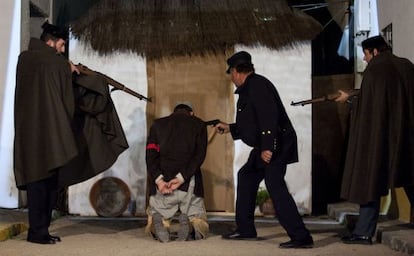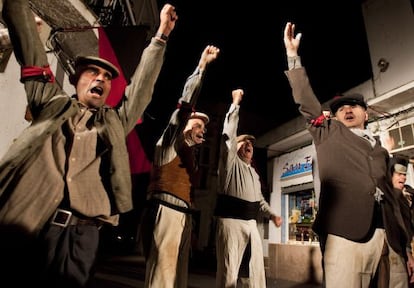Theater therapy for atrocity town
Locals recreate 1933 Casas Viejas massacre in the streets where it took place

An anarchist uprising that swept through Spain 80 years ago had tragic consequences for the small Andalusian town of Casas Viejas. The insurrection, from which the leading anarchist union distanced itself, was based on the ideology of libertarian communism propounded by Russian revolutionary Mikhail Bakunin. There were fatal confrontations at barricades in Barcelona and incidents in Aragon and Valencia.
In Casas Viejas, Cádiz, the local farmhands, jornaleros , saw the opportunity to throw off the yoke of the latifundista landowners and rose up in arms. Surrounding the local Civil Guard headquarters on the night of January 10, the workers were unaware the rising had been put down nationwide and condemned by the CNT a day earlier. Shots were exchanged and the sergeant and one of three guards in the building died later of their wounds.

A unit of civil and assault guards sent to Cádiz at the start of the insurrection arrived in Casas Viejas on the afternoon of January 11, meeting stiff resistance from a group of jornaleros barricaded in a cottage. The building was razed to the ground, killing four men and two women. Another man and woman who tried to escape were gunned down at the door. During the night, the guards rounded up anyone with a firearm and executed 12 workers in cold blood. Other villagers were shot on sight. In all, 26 people were killed at Casas Viejas.
In the small town, now called Benalup, the massacre has always weighed heavily on the population, because of the repercussions it had on a national scale. The press used it as a weapon against the Second Republic under Manuel Azaña, and the town suffered accordingly through repression.
The children of the people killed have never wanted to talk about it"
Historians have long scoured Benalup's streets in search of fingerprints of the massacre. Jerome R. Mintz wrote the book The Anarchists of Casas Viejas , on which a play performed five years ago in the Benalup theater by local troupe El Hijo was based. Now, to mark the 80th anniversary, the play is being staged in the streets where the massacre took place. "I think it's a point of silent inflection," says Manuel Ruiz Mateos, one of El Hijo's managers. "The children of the people killed have never wanted to talk about it but through this work and the effort they have made to explain what happened that barrier has been broken down."
Last Friday, Benalup was converted into the Casa Viejas of eight decades earlier, with CNT banners, roofs of heather and streets of sand. Many residents helped to bring about the conversion, which allowed actors to recreate the events of 80 years against a backdrop of the old Civil Guard building, the headquarters of the CNT, the doomed cottage owned by Francisco Cruz Gutiérrez - also known as "Six Fingers," and the cemetery on the outskirts of town. The actors, including many women representing the families of Casas Viejas, filled the air with screams and cries while a computer-generated projection filled the street where Six Fingers' cottage stood with flames. A requiem composed for the work and flamenco artists accompanied the show.
"The people themselves have made this possible," said Mateos. "It's a collective therapy for Casas Viejas by Casas Viejas."
It is a little late, though, for Juan Silva, the son of María Silva, the lone survivor of the assault on the cottage. María was later assassinated during the Civil War (1936-1939). Juan died last year, with a suit pending in the High Court to discover the whereabouts of his mother, who was known in life as La Libertaria .
Tu suscripción se está usando en otro dispositivo
¿Quieres añadir otro usuario a tu suscripción?
Si continúas leyendo en este dispositivo, no se podrá leer en el otro.
FlechaTu suscripción se está usando en otro dispositivo y solo puedes acceder a EL PAÍS desde un dispositivo a la vez.
Si quieres compartir tu cuenta, cambia tu suscripción a la modalidad Premium, así podrás añadir otro usuario. Cada uno accederá con su propia cuenta de email, lo que os permitirá personalizar vuestra experiencia en EL PAÍS.
¿Tienes una suscripción de empresa? Accede aquí para contratar más cuentas.
En el caso de no saber quién está usando tu cuenta, te recomendamos cambiar tu contraseña aquí.
Si decides continuar compartiendo tu cuenta, este mensaje se mostrará en tu dispositivo y en el de la otra persona que está usando tu cuenta de forma indefinida, afectando a tu experiencia de lectura. Puedes consultar aquí los términos y condiciones de la suscripción digital.








































